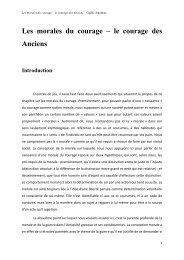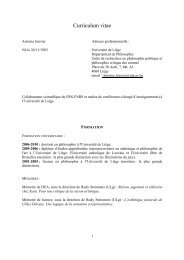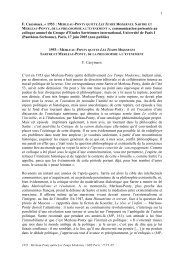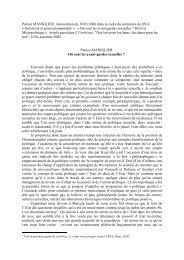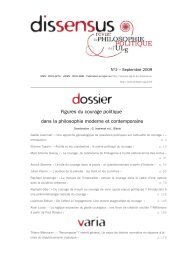Subjectivations politiques et économie des savoirs - Service de ...
Subjectivations politiques et économie des savoirs - Service de ...
Subjectivations politiques et économie des savoirs - Service de ...
You also want an ePaper? Increase the reach of your titles
YUMPU automatically turns print PDFs into web optimized ePapers that Google loves.
– Sophie Bourgault: « Prolegomena to a rehabilitation of Platonic mo<strong>de</strong>ration » – p. 137<br />
word-content of songs ought to be the object of legislation. If one hopes to create<br />
young adults who are in control of their <strong><strong>de</strong>s</strong>ires for swe<strong>et</strong> foods, money or power, one<br />
must expose children to mousikē that portray individuals who are capable of limiting<br />
their longings for such things, or alternatively, to mousikē which overlooks their<br />
importance or existence (Republic 395c).<br />
Plato’s politics of mo<strong>de</strong>ration calls for much censorship – and particularly for the<br />
censorship of what children hear, see and sing. In contemporary terms, the realization<br />
of mo<strong>de</strong>ration in our own cities would entail, for instance, legislating children’s<br />
television programming and advertising. Needless to say, Plato would be compl<strong>et</strong>ely<br />
baffled by the fast-pace T.V. shows children gulp down, but more importantly, he would<br />
be shocked by the nature and amount of advertisement children are inundated with. It<br />
is easy to see how, from Plato’s viewpoint, few things could contribute more to the<br />
molding of greedy or gluttonous souls than bombarding the young with suggestive<br />
accounts of the joys of material consumption or that of swe<strong>et</strong> foods. « In fact, we could<br />
hardly point to a greater force for good – or evil – than this inevitable assimilation of<br />
character. » (Laws 656b) But it is equally easy to see how, from a liberal perspective,<br />
few things would be as unappealing as a program of Platonic propaganda – be it a<br />
campaign promoting the merits of a frugal existence or one promoting the virtues of<br />
broccoli. (But to this liberal objection one could counter briefly that few of the most<br />
beneficial programs of social reform have been realized without consi<strong>de</strong>rable amounts<br />
of propaganda.) If only a small number of us are comfortable with the i<strong>de</strong>a of replacing<br />
the sugar industry’s aggressive propaganda with state-sponsored, Platonic propaganda<br />
for virtue or broccoli-eating, nobody is entirely blind to the absurdity of having millions of<br />
dollars invested in the prevention and treatment of child (and adult) obesity each year<br />
while at the same time tolerating that the bulk of the advertisements watched by young<br />
children have to do with sugary foods. 54<br />
Similarly, many people readily acknowledge today that our over-consumption (be it of<br />
food, oil, or cheaply produced plastic goods) has led to <strong>de</strong>plorable environmental<br />
<strong><strong>de</strong>s</strong>truction. And y<strong>et</strong>, few are willing to cheer at the i<strong>de</strong>a of using the power of law to<br />
limit the amount of wealth and material goods that individuals may acquire. Now, the<br />
latter is precisely what Plato’s work is inviting us to reflect on. For him, molding<br />
mo<strong>de</strong>rate citizens not only required consi<strong>de</strong>rable investments in early childhood<br />
54<br />
For instance, a recent article published in Pediatrics claims that of all food products advertised on<br />
television targ<strong>et</strong>ing American children (age 2-11), 80.7% are « high in sugar ». See L. Powell <strong>et</strong> al.,<br />
« Nutritional Content of Television Food Advertisements Seen by Children and Adolescents in the United<br />
States », Pediatrics, vol. 120, 2007, p. 579. This reality is especially absurd in light of the fact that we<br />
readily acknowledge that advertising works. For the links b<strong>et</strong>ween advertising and obesity see:<br />
« Children, Adolescents, and Advertising », Pediatrics, vol. 118, 2006, p. 2563-2569. The later study<br />
estimates that only 3% of advertisements viewed by children concern healthy foods (p. 2565).



